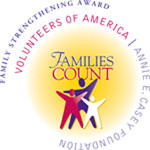Look Up and Hope
Strengthening Families Affected by Incarceration

Since 1896, Volunteers of America has been serving prisoners and their families. Founders Maud and Ballington Booth believed in reform and redemption, and those core values led to our Look Up and Hope program. Its goal is to break the cycle of poverty for children affected by incarceration and help them reach their full potential.
More than 2.7 million children have a mother or father in jail or prison.
Parents' arrest and imprisonment often have a profound, negative impact on their minor children. Generally impoverished to begin with, most children of prisoners become even poorer upon their parents' arrest. They exhibit high rates of anxiety, depression, post-traumatic stress and attention disorders. They are also at increased risk of homelessness, household disruption, school failure and delinquency.
Volunteers of America uses a holistic, research-based approach to breaking the cycles of poverty and incarceration. With the generous support of the Annie E. Casey Foundation, Look Up and Hope operates three pilot programs at Volunteers of America's Indiana, Texas and Dakotas affiliates. The program offers prisoners, their children and the children's caregivers a comprehensive array of coordinated support services, including vocational training and employment services; educational programming and support for all family members; cognitive behavioral therapy; mental health and substance abuse treatment; group and family counseling; life-skills and parenting classes; caregiver support groups; graduated visitation opportunities; family-centered assessments; strengths-based service planning; and mentoring.
Our strength-based approach, focusing on three generations—the child, the mother and the caregiver (often grandmother)—is a solid commitment by Volunteers of America to stay with these families for the long-term. Our hope is that we can help them conquer the barriers so often associated with those affected by incarceration and poverty, such as substance abuse, domestic violence and mental illness.
By providing a network of stability, we reduce the rate of recidivism, helping the previously incarcerated to become healthy, contributing members of society. By acting now, we can show children another path, reducing the probability that children with incarcerated parents may themselves enter the criminal justice system.
Resources
- Fact sheet Look Up and Hope Annual Progress Report
- Fact sheet Look Up and Hope Process Evaluation 2015

